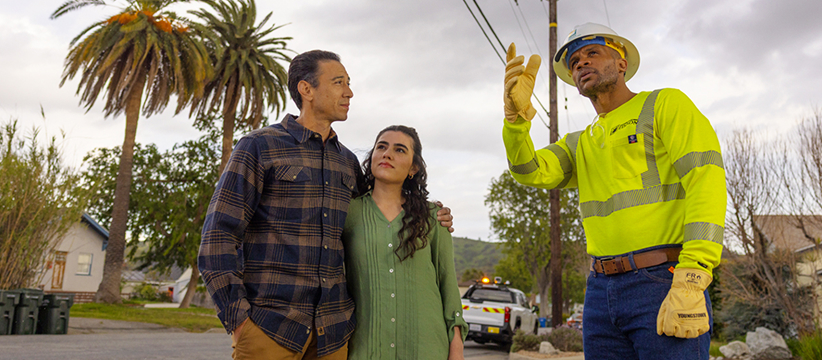What is a Public Safety Power Shutoff?
The threat of wildfires in California is real and growing. With one-quarter of SCE’s service area in high-risk fire areas, keeping our communities safe by preventing wildfires is a top priority.
One critical tool we use to prevent wildfires is the Public Safety Power Shutoff (PSPS), in which we may temporarily shut off power to your neighborhood during dangerous weather conditions to prevent our electric system from becoming a source of ignition. These safety shutoffs are a measure of last resort for keeping you and your community safe.
Check Outage Status
View current outages, sign up for alerts on status, or report a new outage in the Outage Center.
We base PSPS decisions on data gathered from fire scientists and meteorologists forecasting dangerous wildfire conditions, and on real-time information from our crews in the field. We understand that a PSPS event can create hardships for affected customers, and the decision to shut off power is never taken lightly.
Preparing for a PSPS Event
A PSPS event will last as long as the dangerous fire weather conditions persist. When weather improves, we will inspect our lines for damage before restoring power. This typically takes up to eight hours but could take longer if we need daylight for safe inspections. The most recent information on estimated restoration ranges may always be found on the Outage Map.
- Keep important telephone numbers near your home's main phone (fire department, paramedics, police, hospital, doctors, relatives, neighbors).
- Keep flashlights in easy-to-find spots, like near phones, and make sure they're charged or have spare batteries.
- Consider keeping at least one vehicle at least half full of fuel. Gas stations need electricity to pump gas and will be shut down during an outage. Please note that stockpiling gasoline is not recommended. Gasoline is a hazardous, combustible substance. Portable gasoline generators should never be used inside homes, garages, office buildings or other enclosed spaces.
- Use your cellphone as a Wi-Fi hotspot — Find out if your cellphone can be used as a hotspot to connect to the internet. If so, you can connect your laptop or tablet to the Wi-Fi hotspot on your phone, a process called tethering. Keep in mind that when your phone is being used as a hotspot, it is sharing your monthly data allotment with other devices.
- Install surge protectors to safeguard valuable electronics like computers and home entertainment systems. Be sure they are properly rated for your electronics.
- Get acquainted with your home’s utility boxes (electricity, water and gas), learn how to turn them off and keep the tools handy.
- Learn to manually open your home’s automatic garage door or gate when power is out.
- Gather loved ones periodically to review the family safety plan, including how you will address the needs of infants, the elderly, persons with disabilities and pets.
- Conduct employee awareness training to educate staff on the safest response before, during and after an event.
- Learn how to override or manually operate security gates.
- Develop a business continuity plan that defines employee roles and responsibilities during an electric outage.
- Create a list of critical equipment that must be turned off during an outage to prevent damage.
- Try to keep mobile devices fully charged at all times.
- Familiarize yourself with your office’s utility boxes (electricity, water and gas) and how to turn them off; keep the proper tools handy.
- Identify an off-site meeting area in case you need to evacuate.
- If you plan to operate an emergency generator during an outage, please call 1-800-990-7788 and let us know. This helps us protect our employees from possible electrical backfeed.
- If you have a portable gas generator, identify an outdoor location where you can safely use it in a power outage – never use a generator indoors.
- If you do not have a generator, consider renting a portable one, if needed.
- Keep flashlights in easy-to-find spots, like near phones, and make sure they're charged or have spare batteries.
- Consider keeping at least one vehicle at least half full of fuel. Gas stations need electricity to pump gas and will be shut down during an outage. Please note that stockpiling gasoline is not recommended. Gasoline is a hazardous, combustible substance. Portable gasoline generators should never be used inside homes, garages, office buildings or other enclosed spaces.
- Use your cellphone as a Wi-Fi hotspot — Find out if your cellphone can be used as a hotspot to connect to the internet. If so, you can connect your laptop or tablet to the Wi-Fi hotspot on your phone, a process called tethering. Keep in mind that when your phone is being used as a hotspot, it is sharing your monthly data allotment with other devices.
Power shutoffs currently in effect or under consideration due to heightened wildfire risk:
Current Public Safety Power Shutoffs
| Of SCE’s 5 million customers: | 0 |
Power Safety Shutoffs Being Considered
| Of SCE’s 5 million customers: | 0 |
No counties/customers currently under consideration for power shutoffs.
Notes:
- Field and weather conditions change regularly and there may be a delay in posting updates. Please check back for updates on recently affected areas.
- Customer counts are based on county circuits. If a circuit expands beyond one county, customers will be counted in each county, resulting in a potential overcount.





